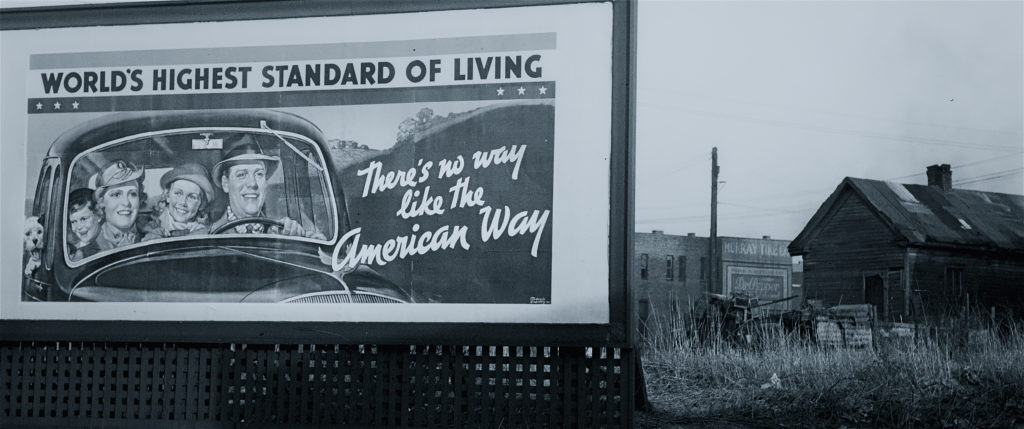
If there’s potential for a silver lining in the worldwide shitshow in which we currently find ourselves helplessly bobbing, it’s perhaps the chance to reexamine the aspects of American life which, more and more clearly, do not pass the stress test. Through brutal trial and painful error, more and more people are seeing the fundamental flaws in a system that ties healthcare inextricably to employment, or that bestows higher wages (and, even more bafflingly, respect) to mindless office drones than to dedicated service workers. Call me naive, but I have genuine optimism that by the time this is all over enough people’s eyes will be open that we might start to see some honest-to-god systemic change. Or maybe the sanitizer fumes are just getting to my head.
In any event, things are obviously fucked at the moment. But they didn’t just get fucked, nor have they always been: our circumstances are the result of centuries of shifting sands of corruption and happenstance. The history, and possible futures, of our lurching Frankenstein economy are explored in the new documentary Capital in the Twenty-First Century. Based on the bestselling book of the same name by French economist Thomas Piketty (who also serves as a guiding talking head), Capital takes us from the outrageous excesses and inequality of the French and English aristocracies to the present day, in which neither you nor your seven college-educated roommates may ever afford a house. In between, the thread runs through the Great Depression and the 2008 Recession, the New Deal and Reaganomics, a few brief moments of enlightenment and many, many waves of hate-based populism. Through it all, Piketty muses on the societal and psychological factors that have informed the world’s economies for the past few generations, and where they might lead us– and what we might be able to do about it.
In the interest of transparency, I should confess right now that I absolutely do not have a head for economics; from my particular financial vantage point, the stock market has always looked like Dungeons & Dragons for people who own BMWs. So it’s a testament to Piketty, directory Justin Pemberton, and the chorus of experts brought into the film that I was able to follow along perfectly and understand exactly why I should be outraged. Pemberton keeps the proceedings going with an engaging blend of infographics, charismatic talking heads, and relevant clips from everything from Les Miserables to Gold Diggers of 1933 to Koyaanisqatsi (he probably could have gone a little easier on the latter, which is sampled so heavily as b-roll that Godfrey Reggio could probably claim co-directing credit). The film takes hundreds of years of byzantine socio-political nuance and presents them clearly and methodically, taking us by the hand and allowing us to determine when, exactly, things started to go sour.

So when did they? The short answer, as you might expect, is that they always have been– but of course it’s more complicated than that. One of the film’s central ideas is that capital, by its nature, tends to bring out the worst in people, causing them to hoard wealth for wealth’s sake like so many Marie-Antionettes or Gordon Gekkos. In one fascinating section, a psychologist describes an experiment in which students were made to square off in Monopoly, but with one player starting with twice as much money as the other. That the game proved unwinnable to the disadvantaged player is, of course, no surprise. What’s remarkable, however, is the effect on the winning players, who quickly become arrogant and convinced of their own talent (there is footage; you will want to hit them). When interviewed at the end of the game about their strategy, not a single one cites the fact that they started the game with a randomly distributed advantage. The conclusion is both obvious and chilling: to the monied, money is an inherent virtue, and because they have it, they deserve to have more.
There’s an elephant in the room, of course. Though he only turns up in the film briefly (not counting a couple of cheekily selected archival soundbites about making countries great again), it’s difficult to watch Capital in the Twenty-First Century and not think about our current Capitalist in Chief. Donald Trump exists as an apotheosis of everything Piketty and his colleagues describe: a force whose entire public persona, political career, and personal ethos are founded on self-perpetuation and the mindless, near-pathological accumulation of capital. His absence is clearly a deliberate choice on Pemberton’s part, made with full knowledge of the context that audiences will bring to the table. Trump is not the first politician to use his office for personal gain, nor is he the first to exploit hatred of an alien other to ply his constituency. He’s just among the most shameless.
Capital in the Twenty-First Century is not a feel-good movie, nor does it offer easy answers. But it also avoids indulging in despair (or worse, Michael Moore-ish mawk), and doesn’t leave you feeling too beaten down. Pemberton delivers his message with a canny pop sensibility, and, crucially, provides a few glimmers of hope: economists give their views on what we might be able to do to at least mitigate the tailspin, and we do see moments– the scrutiny placed on capitalism following the first World War, the strides in social progress made in the ‘60s– that challenge the monolith of growth-at-all-costs capitalism. Things may be bleak right now, but as long as the world remains unpredictable, there’s always a chance that some change may be for the better.
Capital in the Twenty-First Century
2019
dir. Justin Pemberton
103 min.
Now available to rent via the Coolidge Corner Theatre’s Virtual Screening Room
Streaming is no substitute for taking in a screening at a locally owned cinema, and right now Boston’s most beloved theaters need your help to survive. If you have the means, the Hassle strongly recommends making a donation, purchasing a gift card, or becoming a member at the Brattle Theatre, Coolidge Corner Theatre, and/or the Somerville Theatre. Keep film alive, y’all.

